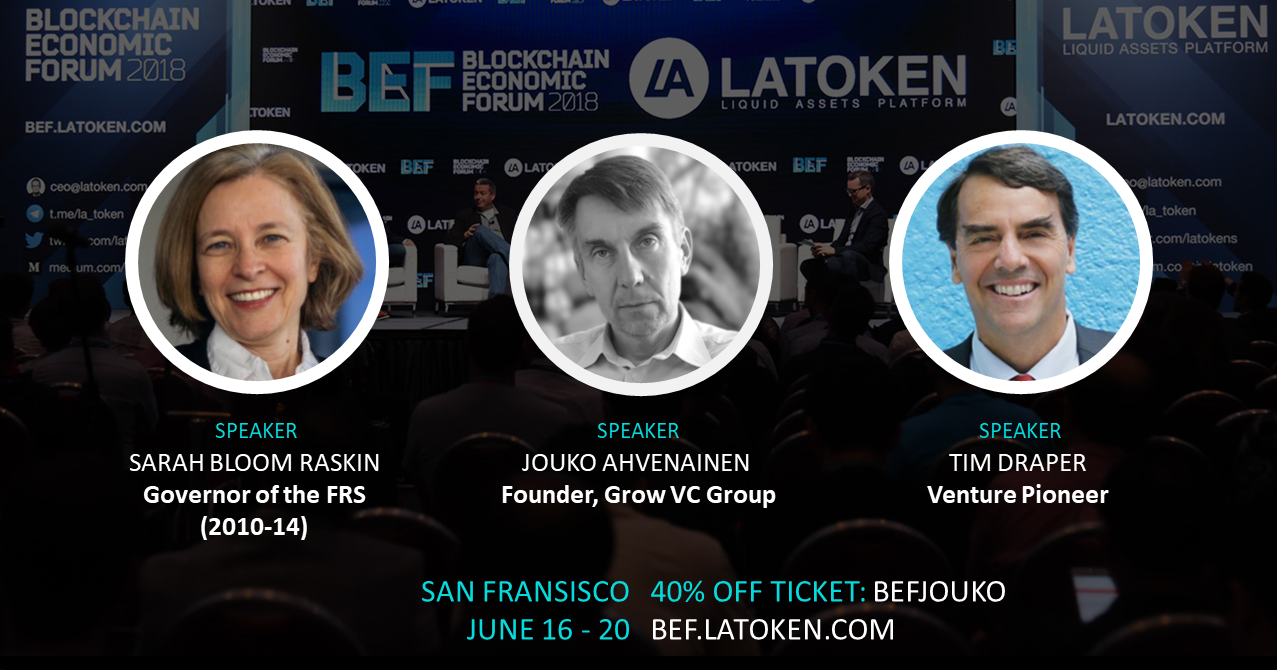|
Zurich, June 28, 2018 – Grow VC Group, a leading global FinTech holding company, moves its European office from London to Zurich on July 1. The holding company focuses on managing ownerships and coordinating group activities and this move has no impact on operative companies or their businesses. The Group’s head office is located in Hong Kong and the North America office in New York. The majority of operative companies are headquartered in the US. German, French and Italian version of this text available: Die Grow VC Group verlegt ihre europäische Niederlassung von London nach Zürich Grow VC Group va transférer son siège européen de Londres à Zurich Grow VC Group trasferisce la sua sede europea da Londra a Zurigo FinTech business is growing rapidly in the whole of Europe. Switzerland has a good central location in Europe, excellent global connections and strong reputation and business in finance. Jouko Ahvenainen, Grow VC Group Chairman, comments the move “we see Switzerland as an excellent location for finance business in Europe, especially when our companies have more business also in German speaking countries, France, Spain and Italy. We have also seen Switzerland develop to adapt new innovative finance models, including blockchain and crypto finance.” Ahvenainen continues “Brexit has an impact on the decision. We prefer places that are open for international business, able to offer a stable international environment and have well educated technology talent pools. FinTech is more and more based on advanced technology and data which can be challenge for London, where competence is deeper in finance instruments than disrupting the industry with technology. Brexit has more practical influence on our operative companies than the holding company.” Grow VC Group’s operative companies are also conducting their own evaluations about best locations in Europe and will announce more about their office locations later in this year. The Group sees growth around Europe at the moment, when also more traditional finance institutions have started transitions to new technologies and services. Outside Europe the Group sees growth especially in emerging markets, where many people have been outside financial services and now they transition directly to use new services. The Group’s companies have made new significant contracts, for example, in Vietnam and Indonesia most recently. More information: Jouko Ahvenainen, Co-Founder & Chairman jouko@growvc.com Photo: Wikipedia
Zurigo, 28 giugno 2018 - Grow VC Group, una holding leader globale in FinTech, trasferisce il suo ufficio europeo da Londra a Zurigo il 1 ° luglio. Il focus del gruppo e’ sulla gestione della proprietà e sul coordinamento delle attività di gruppo e questa mossa non avrà alcun impatto operativo sulle società che ne fanno parte e le loro attività. Le sedi principali del gruppo sono situate a Hong Kong e a New York in Nord America. La maggior parte delle società operative ha sede negli Stati Uniti.
Il business del FinTech sta crescendo rapidamente in tutta Europa. La Svizzera ha una posizione centrale in Europa, ottimi collegamenti globali e una solida reputazione e affari nel mondo finanziario. Jouko Ahvenainen, presidente di Grow VC Group, commenta la mossa con "riteniamo che la Svizzera sia un luogo eccellente per gli affari finanziari europei, specialmente perché le nostre aziende stanno incrementando i loro business anche in paesi di lingua tedesca, Francia, Spagna e Italia. Abbiamo anche visto la Svizzera spingere per l’adozione di nuovi modelli di finanza innovativi, tra cui blockchain e cripto-finanza". Ahvenainen continua "La Brexit ha un impatto sulla decisione. Preferiamo un contesto che sia aperto alle imprese internazionali, in grado di offrire un ambiente internazionale stabile e avere accesso a talenti tecnologici ben istruiti. Il business del FinTech è sempre più basato su tecnologia e dati che possono rappresentare una sfida per Londra, data la più profonda competenza negli strumenti finanziari che non nel settore tecnologico. La Brexit avrà un'influenza più diretta sulle nostre società operative che sulla holding ". Le società operative di Grow VC Group stanno inoltre conducendo le proprie valutazioni sulle migliori sedi in Europa e annunceranno di più a riguardo delle loro scelte durante l’anno. Il Gruppo vede una forte crescita del mercato Europeo al momento, posizione supportata dal fatto che anche le istituzioni finanziarie più tradizionali hanno iniziato la transizione verso nuove tecnologie e servizi. Al di fuori dell'Europa il Gruppo vede una crescita soprattutto nei mercati emergenti, dove la maggior parte della popolazione si trova fuori dai servizi finanziari e ora passano direttamente all'utilizzo di nuovi servizi. Le società del Gruppo hanno stipulato nuovi contratti significativi, ad esempio, in Vietnam e in Indonesia più di recente. Maggiori informazioni: Jouko Ahvenainen, Co-fondatore e Presidente jouko@growvc.com Zürich, 28. Juni 2018– Grow VC-Gruppe, eine führende globale FinTech-Holdinggesellschaft, verlegt am 1. Juli ihre europäische Niederlassung von London nach Zürich. Die Holding konzentriert sich auf die Verwaltung von Eigentümern und die Koordination von Gruppenaktivitäten. Dieser Umzug hat keine Auswirkungen auf operative Unternehmen oder deren Geschäfte. Der Hauptsitz der Gruppe befindet sich in Hongkong und das Nordamerika-Büro in New York. Die Mehrheit der operativen Gesellschaften hat ihren Hauptsitz in den USA.
Das FinTech-Geschäft wächst rasant in ganz Europa. Die Schweiz hat eine gute zentrale Lage in Europa, ausgezeichnete globale Verbindungen und eine starke Reputation und ein gut laufendes Finanzgeschäft. Jouko Ahvenainen, Vorsitzender der Grow VC Group, kommentiert den Schritt: „Wir sehen die Schweiz als exzellenten Standort für das Finanzgeschäft in Europa, vor allem wenn unsere Unternehmen auch in deutschsprachigen Ländern, Frankreich, Spanien und Italien mehr Geschäfte machen. Wir haben auch gesehen, dass sich die Schweiz entwickelt, um sich an neue innovative Finanzierungsmodelle, einschließlich Blockchain- und Krypto-Finanzierungen, anzupassen.“ Ahvenainen fährt fort: „Der Brexit beeinflusst die Entscheidung. Wir bevorzugen Orte, die offen für internationale Geschäfte sind, in der Lage sind, ein stabiles internationales Umfeld zu bieten und gut ausgebildete Technologie-Talentpools zu haben. FinTech basiert mehr und mehr auf fortschrittlichen Technologien und Daten, die für London eine Herausforderung darstellen können, da die Kompetenz in Finanzinstrumenten liegt, die die Branche durch Technologie stört. Brexit hat einen praktischeren Einfluss auf unsere operativen Gesellschaften als die Holding.“ Auch die operativen Gesellschaften der Grow VC Group führen eigene Evaluationen über die besten Standorte in Europa durch und werden später in diesem Jahr mehr über ihre Bürostandorte bekannt geben. Die Gruppe sieht derzeit ein Wachstum in ganz Europa, wo auch traditionellere Finanzinstitute den Übergang zu neuen Technologien und Dienstleistungen begonnen haben. Außerhalb Europas sieht die Gruppe vor allem in den Schwellenländern ein Wachstum, in dem viele Menschen außerhalb der Finanzdienstleistungen tätig sind und jetzt direkt auf neue Dienste umsteigen. Die Unternehmen der Gruppe haben neue bedeutende Verträge abgeschlossen, zuletzt in Vietnam und Indonesien. Mehr Informationen: Jouko Ahvenainen, Mitbegründer & Vorsitzender jouko@growvc.com Zurich, le 28 juin 2018 - Grow VC Group, l'un des principaux acteurs mondiaux de la FinTech, va transférer son siège européen de Londres à Zurich à partir du 1er Juillet. La décision n'aura aucun impact sur les entreprises faisant de leurs activités. Le siège du groupe est situé à Hong Kong et à New York, pour le marché nord-américain. La plupart des ses sociétés d'exploitation sont aux États-Unis.
Le marché de la FinTech se développe rapidement dans toute l'Europe. La Suisse a une position centrale et d'excellentes relations mondiales, avec une réputation solide dans le monde financier. Jouko Ahvenainen, président du Grow VC Group, commente cette décision: "Nous pensons que la Suisse est un excellent pôle pour les affaires financières européennes, d'autant plus que nos entreprises augmentent leurs activités dans les pays germanophones, en France, Espagne et Italie. Nous avons également vu la Suisse évoluer vers de nouveaux modèles de financement innovants utilisant la blockchain et la crypto-finance ». Ahvenainen poursuit: «Le Brexit a influencé notre décision, nous préférons un contexte ouvert aux entreprises internationales, capable d'offrir un environnement international stable et d'avoir accès à des talents technologiques bien formés. Les FinTech s'appuient de plus en plus sur la technologie et les données ce qui peut être un défi pour Londres, puisqu'ils ont une plus grande compétence dans les instruments financiers que dans le secteur de la technologie. Le Brexit aura une influence beaucoup plus directe sur nos sociétés d'exploitation que sur notre groupe ". Les sociétés d'exploitation du Grow VC Group évaluent également un mouvement similaire mais sur d'autres sites en Europe et il y aura des annonces à ce sujet au cours de l'année 2018. Le groupe connaît actuellement une forte croissance sur le marché européen, une position soutenue par le fait que les institutions financières plus traditionnelles ont commencé la transition vers de nouveaux services et technologies. En dehors de l'Europe, le groupe voit sa croissance principalement dans les marchés émergents, où la majorité de la population est à court de services financiers et adopte directement de nouveaux services et technologies. Par exemple, les sociétés du groupe ont récemment signé de nouveaux contrats pour de grands projets au Vietnam et en Indonésie. Plus d'informations: Jouko Ahvenainen, co-fondateur et président jouko@growvc.com Recently I was watching a discussion about the ethical questions of AI – in other words, how to guarantee AI is more good than bad to human beings and societies. Nowadays many discussions are easily polarized, and this seems to be the case for AI ethics too. There are strong opinions that either people can always use machines (including AI) for their own good, or AI machines will be apocalyptic beasts. Now is the time to evaluate this more deeply. Some people defend AI, saying it’s not a threat because it’s all basically software code programmed by humans who can also create rules for behavior in each situation. They can decide and control what kind of ethical decisions machines make, and create iron rules that cannot be broken. These people also often argue that what and what kind of machines will be allowed is a political decision. The other side of that coin is that humans are exactly the problem – or at least those humans who will create machines to amplify their own power and position in business and society. Slave machines will do the work of people, sex robots will replace human partners, and fighter robots will populate armies. Basically, the logic is that bad people with bad intentions can – and will – do bad things with AI and machines to gain power in the world. The reality is much more complex. Here are five questions that explore a few aspects of this debate: 1. Can political processes control what kind of machines and ethics rules are implemented? It is hard to believe that any political decision can really stop development of AI. History gives us lots of examples – if something is technically possible, someone will implement it sooner or later. There are many motivations to do so – making money, improving business, gaining power or just intellectual curiosity. New solutions and machines will be used for business purposes. Even if governments decide to ban them for private use, they would still be developed for military purposes. Or perhaps criminals and terrorists would develop them for their own purposes. This is not to say that politicians, governments and societies can’t develop rules and laws for machines – the point is that bans and overly-restrictive rules never work. 2. Is AI technology only bad, or is it just another step of the natural development of human society that has seen our lives improve in many ways? There have always been people who see development or progress as a threat. Of course, AI machines raise many complex questions, not only in terms of how the machines behave, but also the purposes for which they are developed. They can replace workers and change the distribution of wealth, and these changes can create crises for many individuals. At the same time, we have seen these kinds of changes many times before throughout history, such as the shifts from agricultural societies to industrial societies and then services societies. At the same time, however, all parties must take these issues seriously and work to find solutions for them. This means, for example, finding solutions for wealth distribution (perhaps in the form of new tax and basic income systems), human rights and how each human being can maintain her or his dignity. 3. Can we program ethical rules for machines so that everything works based on our rules? It is still unknown if machines will ever develop consciousness. At the very least we can say that if they do, it will be different from human consciousness. In any case, some machines are already becoming so complex that we cannot create simple rules for them to govern how they think and behave. Machines process so much data and learn from it that it’s not possible for us to predict their behavior in each situation, especially when machines are linked to each other and learn from each other too. There is currently work being done to create a kind of ‘moral machine’ inside AI. This can include top-down type categoric rules (e.g. “never do this”) and bottom-up learning from different real-world situations. Nowadays it is thought that these moral machines should be based on a hybrid model of rules and learning. But there are still many complex problems to be solved to get this to work. 4. Do we even know – and can humans agree on – which ethical rules to implement? This is one important question that is often ignored in AI and machine ethics discussions. Not all people are ethical – or, put another way, many people have very different ideas of what constitutes ethical behavior. Even from the philosophical point of view, there are very different approaches – e.g. rule-based deontological models or result-oriented utilitarian models. Then there are even more questions, such as how to interpret models in practical situations. When we need to teach ethics and behavior rules for machines, we must first define common principles. But even if we do that, there will be people who will teach different models to machines – for better or worse – just as people do to each other. 5. Who should take the lead in discussion and decision making on AI ethics? The simple answer is that everyone must participate and have the right to participate in this process. But the reality is more complex. At the very least there will be a combination of technology, business and political processes. Now, even academic discussion is difficult because it requires competence from many areas, such as moral philosophy, data science and economics – not many people fully understand even one of those areas, let alone all three. An important starting point is to increase awareness and encourage open discussion and systematic thinking around these matters. But how many politicians – for example – have seriously started to think and talk about this? As we can see, we have many open and unanswered questions even as AI development is underway – and the truly important questions focus on the interaction between AI machines and human beings and the impact on the latter, not just about machines and their behavior. At the discussion I mentioned at the beginning of this article, someone made an interesting point: human beings and machines will probably become more similar over time, but not only because machines will become more like humans – it will also be vice versa. As machines become central in more important roles, people will start to behave more like machines. The article was first published on Disruptive.Asia. Photo: Wikimedia Commons (Artificial.intelligence.jpg)
Blockchain Economic Forum is organized in San Francisco on June 16 to 19. The focus of the event to discuss and analyze the impact of blockchain, tokenization and crypto finance on the global economy and finance services. Blockchain nowadays really brings together many kind of people: technology gurus, new business builders, finance professionals, policy makers, economists and idealists.
Grow VC Group Co-founder and Chairman Jouko Ahvenainen spoke in the event today. He participates in two panels: 1) Greatest Blockchain Use Cases for the Next Decade, and 2) The Future of the Banking (see presentations below). The main topics in the future blockchain use case panel were:
The future of the banking panel focuses especially on the following topics:
One of the best comment in the banking panel came from the Silicon Valley Venture Capital veteran Pavel Cherkashin, "Regulation is not an obstacle to develop new fintech and blockchain services, we venture capitalists invest all the time in services that are illegal, like Uber and airbnb in many places, it is to get critical mass and the regulation follows." Blockchain Economic Forum web site. Blockchain Economic Forum is organized in San Francisco on June 16 to 19. The focus of the event to discuss and analyze the impact of blockchain, tokenization and crypto finance on the global economy and finance services. Forbes has commented the event: "Blockchain Economic Forum comes back to facilitate the discussions of the most important topics of the crypto economy and its growing influence on the global economy."
Grow VC Group Co-founder and Chairman Jouko Ahvenainen will speak in the event. He participates in two panels: 1) Greatest Blockchain Use Cases for the Next Decade, and 2) The Future of the Banking. He focuses especially to analyze changes in the finance ecosystems and instruments, and give practical examples of new finance services. Now blockchain and tokens are often associated only to ICOs and bitcoin, but token type instruments, smart contracts, and tokenization are going to have impact on all asset classes, finance transaction processing, and how finance can be integrated into many digital services. The speaker list includes many finance, economics and blockchain top names, for example, Tim Draper, top influencer and Venture Capitalist from Silicon Valley, Gary Gensler, former Chairman of the Commodity Futures Trading Commission, Joe Oliver, former Minister of Finance in Canada, and Reese Jones, Singularity University Associate Founder. Sophia, social humanoid robot, will also be in the event. You can register to the event here, and 40% discount for a ticket with the code below. |
AboutEst. 2009 Grow VC Group is building truly global digital businesses. The focus is especially on digitization, data and fintech services. We have very hands-on approach to build businesses and we always want to make them global, scale-up and have the real entrepreneurial spirit. Download
Research Report 1/2018: Distributed Technologies - Changing Finance and the Internet Research Report 1/2017: Machines, Asia And Fintech: Rise of Globalization and Protectionism as a Consequence Fintech Hybrid Finance Whitepaper Fintech And Digital Finance Insight & Vision Whitepaper Learn More About Our Companies: Archives
January 2023
Categories |









 RSS Feed
RSS Feed
